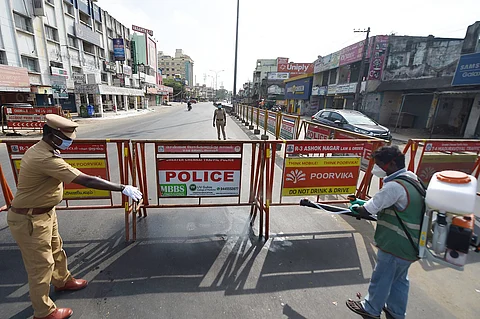

With the nationwide lockdown severely impacting the economic activity in the country, the taxes collected by states are set to see a major impact. This is further set to hit revenues of states as most of it comes from taxes. Among the southern states, Tamil Nadu, Kerala, Telangana, and Karnataka are likely to see the most impact, as per a study by PRS Legislative research on the ‘Impact of Lockdown on Government Revenue’.
This is significant because as per the 2020-21 budget of states, on an average, nearly 70% of their revenue is estimated to come from taxes (45% from their own taxes and 25% from their share of centre’s taxes).
Of the total taxes (GST, Sales tax/VAT and excise), sales tax/VAT and state excise have been major sources of revenue for states, estimated to contribute 16% of states’ revenue in 2020-21.
States can levy sales tax on petroleum products (petrol, diesel, crude oil, natural gas, and aviation turbine fuel) and alcohol for human consumption.
However, with transportation being prohibited and alcohol stores being shut, sale of all these goods has come to a near halt. As a result, the revenue coming from these taxes is likely to see a much larger impact as compared to the other taxes, the report states.
With alcohol sales being stopped completely, Karnataka is likely to lose Rs 1,892 crore (1.05% of its revenue) each month during the lockdown, the report estimates. This is the loss in the state’s excise revenue.
This estimate has been taken with the assumption that there is no production of alcohol for human consumption during the period.
Among the southern states, Karnataka’s loss is the highest, followed by Telangana (Rs 1,333 crore or 0.93%), Tamil Nadu (Rs 687 crore or 0.31%) and Kerala (Rs 233 cr or 0.20%). Data for Andhra Pradesh is not available as the state passed a vote on account.
Overall, across India, Uttar Pradesh is estimated to lose most revenue, at Rs 3,125 crore each month.
Looking at the impact of the lockdown on the sales tax/VAT revenue in 2020-21, the report estimates that Tamil Nadu may lose Rs 3,736 crore per month in Value-added Tax (VAT) revenue.
This estimate is taking into account VAT collected from the sale of alcohol and petroleum products.
To estimate the impact, PRS Legislative Research has assumed an 80% shortfall in tax collections in any month of lockdown.
Tamil Nadu stands to lose the highest, given that 61% of its revenue comes from VAT and non-GST avenues.
Among the southern states, Tamil Nadu is followed by Telangana, which is estimated to lose Rs Rs 1,886 crore, Kerala Rs 1,551 crore and Karnataka Rs 1,186 crore.
Other states that stand impacted majorly include Maharashtra (Rs 2,667 crore) and Uttar Pradesh (Rs 1,886 crore).
Can GST compensation help?
As per the GST (Compensation to States) Act, 2017, the central government is required to provide compensation to states for loss of revenue due to the implementation of GST until 2022.
The report states that while the shortfall in state GST revenue could get offset by the GST compensation provided to states by the central government, it is likely that there may not be sufficient funds to provide compensation to states in 2020-21.
The Act guarantees a 14% annual growth rate in state GST revenue, which is much higher than the growth likely in the year 2020-21. States, on an average, depend on GST compensation grants for 4.4% of their revenue in 2020-21 and the central government is estimated to provide Rs 1,35,368 crore as compensation to states.
Compensation to states is given out of the GST Compensation Fund, where funds come from a cess levied on coal, tobacco and tobacco products such as pan masala, automobiles, and aerated drinks. The cess is levied specifically to generate funds for compensation.
The report estimates that the cess collections may see a shortfall as the sale of many of these goods is likely to be affected this year. “Note that domestic automobile sales declined 18% in 2019-20 over the previous year while coal production stayed constant,” the report states.
The report further states that while there is a risk that any incremental requirement may not be met, the revenue of states can see a much larger impact if cess collections are not even sufficient to meet their existing amounts as per the 2020-21 budgets.
So, what can states do?
Despite there being a fall in revenues, in the light of the pandemic, states are also making an unforeseen expenditure in the health sector.
The report says that states will have to either cut their budgeted expenditure or increase their borrowings to meet the budget targets.
This has already been seen in some cases where some states such as Telangana, Andhra Pradesh, Odisha, Kerala, among others announced pay cuts across the board.
The report states that the other option for states is to increase their borrowings. While the states have a borrowing limit of 3% of their GSDP, states can take consent of the central government to borrow more.
“While most states had already budgeted their fiscal deficit for 2020-21 near the upper limit, it seems some states do have some fiscal space to borrow more. However, with the GSDP expected to take a hit because of the lockdown, fiscal deficit as a percentage of GSDP for all states could be higher than budgeted targets, even if they do not make any additional borrowings,” the report adds.